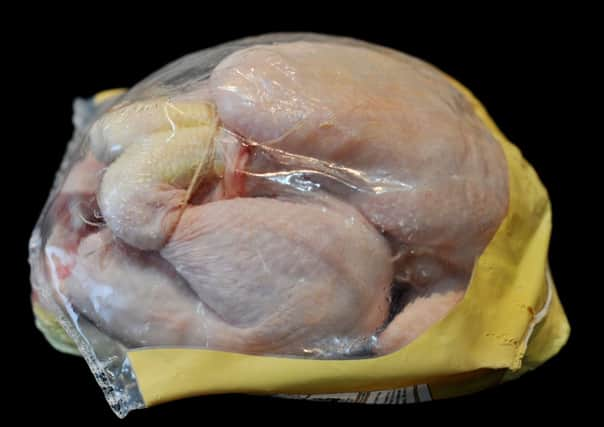Chicken contamination: FSA set to name offenders


The Food Standards Agency’s long-awaited report into the matter has been published with Asda singled out as having significantly more highly contaminated chickens than its rivals.
No retailer is currently meeting campylobacter reduction targets and a total of 70 per cent of all chickens sold in UK supermarkets are contaminated with campylobacter to some degree.
Advertisement
Hide AdAdvertisement
Hide AdThe FSA said these results – which today named individual retailers for the first time – showed more action was needed to protect consumers from campylobacter, which is the UK’s most common cause of food poisoning.
CONNECT WITH THE SCOTSMAN
• Subscribe to our daily newsletter (requires registration) and get the latest news, sport and business headlines delivered to your inbox every morning
Campylobacter thrives in the gut and faeces of poultry and can easily be spread from bird to bird on farms or in abattoirs. The bug is killed by cooking but is easily spread when raw meat contaminates surfaces and utensils in the kitchen. It is the most common cause of food poisoning in the UK, making about 280,000 people ill each year and causing about 100 deaths.
Ahead of the release of the FAS findings Which? have published the results of a consumer survey of public opinion on campylobacter.
The Which? survey of 2,101 UK adults also found three-quarters (76 per cent) trusted that the fresh chicken stocked by supermarkets was safe to eat and nearly nine in 10 people (86 per cent) assumed the food they bought from supermarkets would not make them ill.
However, the survey also found only a third of people (33 per cent) had heard of campylobacter, compared to 94 per cent being aware of salmonella and 92 per cent of E.coli.
An Asda spokeswoman said: “We take campylobacter seriously and it goes without saying that we’re disappointed with these findings. There is no ‘silver bullet’ to tackle this issue, but, along with other retailers, we’re working hard to find a solution.”
In a bid to ward off a major food scare ahead of today’s announcement, retailers this week announced a raft of changes to the way chicken is produced measures include: cook-in-the-bag packaging for whole chickens making it unnecessary to touch them before they are cooked, new technologies to flash freeze batches to kill bacteria on the surface of chicken during processing, and changes in the way chickens are reared on intensive farms.
Advertisement
Hide AdAdvertisement
Hide AdCampylobacter thrives in the gut and faeces of poultry and can easily be spread from bird to bird on farms or in abattoirs. The bug is killed by cooking but is easily spread when raw meat contaminates surfaces and utensils in the kitchen. It is the most common cause of food poisoning in the UK, making about 280,000 people ill each year and causing about 100 deaths.
FSA director of policy Mr Wearne added: “Although we are only halfway through the survey, 18% of birds tested had campylobacter over 1000 cfu/g, the highest level of contamination, and more than 70% of birds had some campylobacter on them.
“This shows there is a long way to go before consumers are protected from this bug.
“If chicken is cooked thoroughly and preparation guidelines are properly followed, the risk to the public is extremely low.
“There are signs that some retailers are starting to step up to their responsibilities. When more do, we will see the sustained improvements that will help prevent many of their customers getting ill.”
A Which? consumer survey of the public opinion of 2,101 UK adults on campylobacter. also found three-quarters (76 per cent) trusted that the fresh chicken stocked by supermarkets was safe to eat and nearly nine in 10 people (86 per cent) assumed the food they bought from supermarkets would not make them ill.
However, the survey also found only a third of people (33 per cent) had heard of campylobacter, compared to 94 per cent being aware of salmonella and 92 per cent of E.coli.
Which? executive director, Richard Lloyd, said: “Our research clearly shows that the majority of people are now concerned about the high levels of this potentially deadly bug in their supermarket chicken. By releasing information about which supermarkets are most affected, the Food Standards Agency will at once put more public pressure on the poor performers to improve and give consumers better information about campylobacter levels.”
SCOTSMAN TABLET AND IPHONE APPS